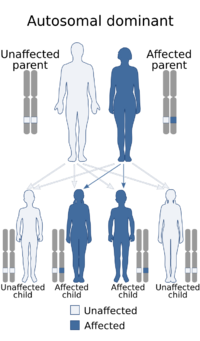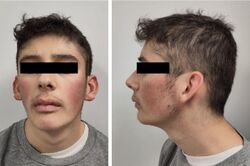Medicine:Coffin–Siris syndrome
Coffin–Siris Syndrome (CSS), first described in 1970 by Dr Grange S. Coffin and Dr E. Siris,[1][2] is a rare genetic disorder that causes developmental delays and absent fifth finger and toe nails. There had been 31 reported cases by 1991.[3] The number of occurrences since then has grown and is now reported to be around 200.[4]
The differential includes Nicolaides–Baraitser syndrome.[5]
Presentation
- mild to moderate to severe intellectual disability,[6][7] also called "developmental disability"[8]
- short fifth digits with hypoplastic or absent nails
- low birth weight
- feeding difficulties upon birth
- frequent respiratory infections during infancy
- hypotonia
- joint laxity
- delayed bone age
- microcephaly
- coarse facial features, including wide nose, wide mouth, and thick eyebrows and lashes
Causes
Disease can be inherited as an autosomal dominant trait, however most cases of CSS appear to be the result of a de novo mutation.[9]
This syndrome has been associated with mutations in the ARID1B gene,[10] which is the most prevalent in CSS.[9]
There are also multiple genes mutations associated to this syndrome, including SOX11,[11] ARID2,[12] DPF2, PHF6, SMARCA2, SMARCA4, SMARCB1, SMARCC2, SMARCE1, SOX4.[9]
The diagnosis is generally based on the presence of major and at least one minor clinical sign and can be confirmed by molecular genetic testing of the causative genes. Recent studies revealed that fifth finger nail/distal phalanx hypoplasia or aplasia is not a mandatory finding.[9]
Typically, lab work will be done to rule out other conditions and genetic testing will also be performed to get the official diagnosis.[9]
Treatment
There is no known cure or standard for treatment. Treatment is based on symptoms and may include physical, occupational and speech therapy and educational services as well.[9]
References
- ↑ Coffin, G. S.; Siris, E. (May 1970). "Mental retardation with absent fifth fingernail and terminal phalanx". American Journal of Diseases of Children 119 (5): 433–439. doi:10.1001/archpedi.1970.02100050435009. ISSN 0002-922X. PMID 5442442. https://pubmed.ncbi.nlm.nih.gov/5442442/.
- ↑ "Grange S. Coffin". https://www.whonamedit.com/doctor.cfm/2855.html.
- ↑ "Coffin-Siris syndrome". Journal of Medical Genetics 28 (5): 338–41. May 1991. doi:10.1136/jmg.28.5.338. PMID 1865473.
- ↑ metrowebukmetro (2008-10-13). "Twisted spine girl back playing football". Metro. http://www.metro.co.uk/news/354388-twisted-spine-girl-back-playing-football.
- ↑ "Nicolaides-Baraitser syndrome: Delineation of the phenotype". American Journal of Medical Genetics. Part A 149A (8): 1628–40. August 2009. doi:10.1002/ajmg.a.32956. PMID 19606471.
- ↑ "Coffin-Siris syndrome". Genetics Home Reference. 8 June 2015. http://ghr.nlm.nih.gov/condition/coffin-siris-syndrome.
- ↑ Cha, Ariana Eunjung (4 June 2015). "NIH researchers sequence healthy volunteers' DNA and find they aren't so healthy after all". Washington Post. https://www.washingtonpost.com/news/to-your-health/wp/2015/06/04/nih-researchers-sequence-healthy-volunteers-dna-and-find-they-arent-so-healthy-after-all/.
- ↑ "Greenville: A home of one's own - Ledger Transcript". Ledger Transcript. 2015-05-14. http://www.ledgertranscript.com/home/16810230-95/a-home-of-ones-own.
- ↑ 9.0 9.1 9.2 9.3 9.4 9.5 Vergano, Samantha Schrier; Santen, Gijs; Wieczorek, Dagmar; Wollnik, Bernd; Matsumoto, Naomichi; Deardorff, Matthew A. (12 August 2021) (in en). Coffin-Siris Syndrome. University of Washington, Seattle. PMID 23556151. https://www.ncbi.nlm.nih.gov/sites/books/NBK131811/.
- ↑ "Coffin-Siris Syndrome with obesity, macrocephaly, hepatomegaly and hyperinsulinism caused by a mutation in the ARID1B gene". European Journal of Human Genetics 22 (11): 1327–9. November 2014. doi:10.1038/ejhg.2014.25. PMID 24569609.
- ↑ "De novo SOX11 mutations cause Coffin-Siris syndrome". Nature Communications 5: 4011. June 2014. doi:10.1038/ncomms5011. PMID 24886874. Bibcode: 2014NatCo...5.4011T.
- ↑ "Extending the clinical and genetic spectrum of ARID2 related intellectual disability. A case series of 7 patients". European Journal of Medical Genetics 62 (1): 27–34. April 2018. doi:10.1016/j.ejmg.2018.04.014. PMID 29698805. http://eprints.gla.ac.uk/162627/7/162627.pdf.
External links
| Classification | |
|---|---|
| External resources |
 |




